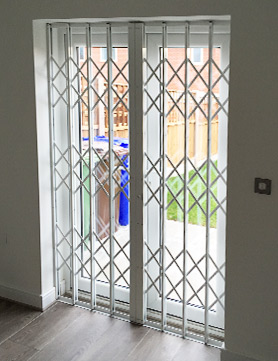For the manufacturing of security grilles, aluminium has several advantages:
- Lighter – this is especially relevant for self-installation. Aluminium grilles are nearly three times lighter than steel grilles.
- Rust – aluminium doesn’t rust, whereas steel will eventually, no matter how they are pre-treated against rust. This is a problem especially if grilles are fitted in bathrooms and kitchens or anywhere else where the grille could get wet like patio doors, front and back doors and externally fitted grilles.

Even pre-treated steel can rust
- Stronger – aluminium is flexible and in the case of an attack or forced entry, it will absorb most of the force. Because steel is rigid, most of the force would go on the fixing points, which are usually the week point. Our uprights are attached to the track using special nylon mouldings – so they cannot be pulled off, unlike some of our competitors who use wheels.
- Environmental – aluminium is 100% recyclable. Aluminium recycling is the process by which scrap aluminium can be reused in products after its initial production. Recycling scrap aluminium requires only 5% of the energy used to make new aluminium. For this reason, approximately one-third comes from recycled scrap. Used beverage containers are the largest component of processed aluminium scrap.

Aluminium Foil is prime for recycling
- Finish – the paint finish is much better than steel. This is especially important in domestic situations.

Aluminium can provide a much better finish than steel
Car manufacturers are increasingly using aluminium. Jaguar Land Rover are world leaders in the area of aluminium body construction for automobiles. The use of aluminium in an automotive application brings many benefits in terms of weight savings, improved fuel efficiency, lower emissions, increased crash safety and even better vehicle dynamics.
The use of aluminium across JLR range of cars is growing – from the all-new Range Rover and Range Rover Sport to the new Jaguar F-TYPE sports car and Jaguar XJ saloon. By introducing aluminium body structures to the Jaguar line initially, the weight of the cars was reduced by around 40%, using aluminium stamped panels, castings and extrusions. The same principles are now being applied to the new Range Rover and Range Rover Sport models – with weight savings on both cars in excess of 400kg.
The aluminium sheets used to form the body panels are made of recycled material. Jaguar is developing an all-new advanced aluminium monocoque vehicle architecture, on which an exciting range of future Jaguars will be built. High-strength, lightweight and extremely stiff, the modular and scalable architecture will enable flexible high-volume production without compromising the unique character, dynamics, performance and luxury that Jaguar is famous for.
Aircraft are made of aluminium because the metal resists corrosion, some airlines don’t paint their planes, saving several hundreds of kilogrammes in weight. Aircraft manufacturers use high-strength alloys to strengthen aluminium aircraft structures.
To discover more about our aluminium security grilles, click here.

